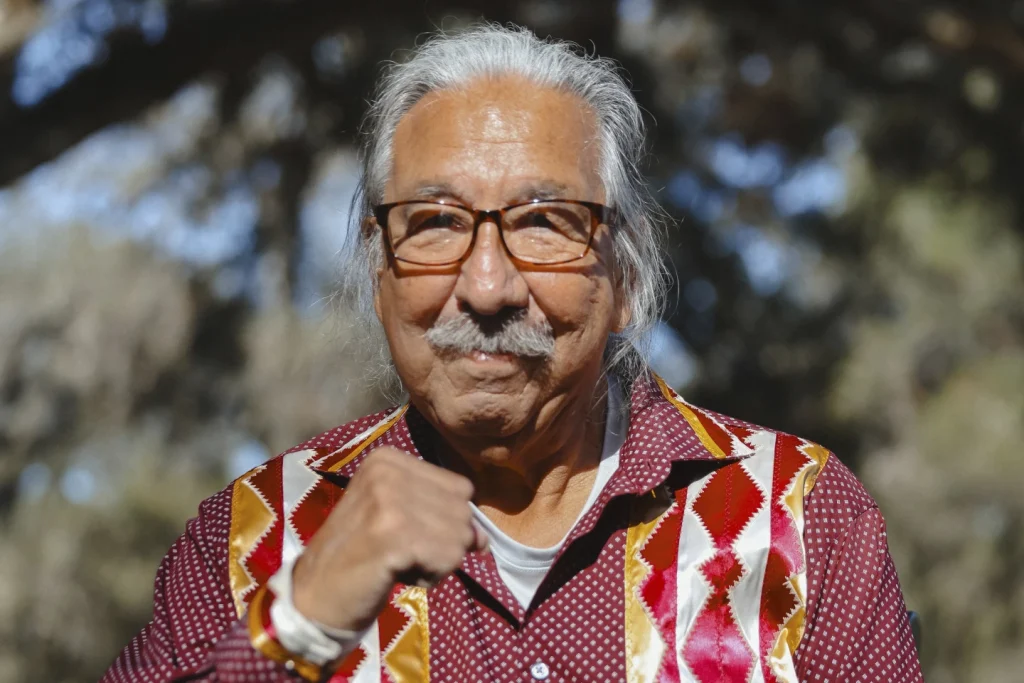Leonard Peltier Released from Prison After Commutation by President Biden.
Leonard Peltier, the Native American activist convicted of the 1975 killings of two FBI agents, was released from a Florida prison on January 20, 2025.
This follows a commutation of his sentence by then-President Joe Biden, granting Peltier home confinement after spending nearly 50 years in federal prison.
Peltier, now 80 years old, left the Coleman penitentiary in an SUV, marking the end of a long legal battle that captivated Native American communities and activists across the nation.
Peltier's case has been controversial for decades, as he maintains his innocence in the deaths of FBI agents Jack Coler and Ronald Williams during a confrontation on the Pine Ridge Indian Reservation in South Dakota.

While prosecutors argue that Peltier shot the agents in cold blood, Peltier has always contended that his actions were in self-defense, and his trial has been marred by questions of fairness, with claims that evidence was suppressed and witness testimonies coerced.
A former member of the American Indian Movement (AIM), Peltier's conviction is seen by many as part of a larger narrative about the U.S. government's treatment of Native Americans. His supporters argue that his imprisonment was politically motivated because of his activism.
As Peltier’s release was met with both joy and contention, his case remains a symbol of the systemic injustices faced by Native Americans in the U.S.
Peltier’s Journey to Release
In a statement before his release, Peltier’s attorney, Jenipher Jones, expressed excitement, stating, “We’re so excited for this moment.
He is in good spirits. He has the soul of a warrior.” Peltier was released on home confinement, a decision made after Biden’s commutation order, which came after Peltier’s deteriorating health became a significant factor in the decision.
Biden’s commutation marked a significant departure from prior administrations, and while it was celebrated by many of Peltier’s supporters, it was met with criticism from others, including former FBI officials.
Among his critics is Michael J. Clark, president of the Society of Former Special Agents of the FBI, who expressed disappointment with Biden’s decision, calling it a "poor reflection" on the president. Clark and others argue that the decision undermines justice for the FBI agents who died in the line of duty.
Peltier’s Supporters Celebrate
For those who have long championed Peltier’s case, his release was a long-awaited victory. Ray St. Clair, a member of the White Earth Band of the Minnesota Chippewa Tribe, stated, “We never thought he would get out. It shows you should never give up hope.”
Many advocates, like Nick Estes, a professor of American Indian Studies at the University of Minnesota, view Peltier as a political prisoner whose case was a symbol of the systemic oppression faced by Native Americans. Estes described Peltier as representing "every person who’s been roughed up by a cop, profiled, had their children harassed at school."
The Broader Context of Leonard Peltier’s Case
Peltier's case sits at the intersection of Indigenous rights, legal battles, and the history of Native American activism.
His release is not just about one man’s freedom but highlights the ongoing issues of racial and political injustice faced by Indigenous communities in the U.S. Native American leaders and activists have long argued that Peltier was wrongfully convicted, and his case has been a rallying cry for those fighting for greater recognition of Native American rights.
The American Indian Movement, of which Peltier was a part, was founded in the 1960s in response to widespread dissatisfaction with the U.S. government's treatment of Indigenous peoples.
AIM fought for treaty rights, improved living conditions for Native Americans, and the preservation of cultural identity. Peltier’s activism placed him squarely in the crosshairs of the FBI, and many of his supporters believe his conviction was part of a broader effort to silence Native American voices.
The Future of Native American Activism and Justice
Looking to the future, Peltier’s release signals a growing awareness of the need to address the historical wrongs committed against Native Americans, though it also underscores how much more work remains.
The legal and political ramifications of his case will likely continue to influence discussions about Native American sovereignty, the criminal justice system, and the treatment of Indigenous peoples in the U.S. While Peltier's supporters celebrate this victory, the broader fight for justice and recognition of Native American rights continues.
Wider Context and History of Leonard Peltier’s Case
The case of Leonard Peltier reflects a broader history of injustice toward Native Americans in the U.S. During the 1970s, the American Indian Movement, which Peltier was heavily involved with, sought to address issues of systemic discrimination, lack of resources, and the exploitation of Native American communities.
The FBI’s actions during this period, including surveillance and interference with AIM activities, are seen by many as part of a larger government effort to suppress Indigenous movements.
In the context of this history, Peltier’s conviction represents more than just an individual legal case—it is emblematic of the ongoing struggles faced by Native Americans for justice, equality, and recognition.
While the commutation of Peltier's sentence provides a sense of closure for some, it also raises important questions about accountability, fairness, and the long-term impact of political activism on Native American lives.
Looking ahead, the case may continue to serve as a touchstone for discussions around prison reform, racial justice, and the rights of Indigenous peoples. Peltier’s story is far from over, and his ongoing fight for full exoneration will likely remain a focal point for both legal scholars and social justice activists alike.



















